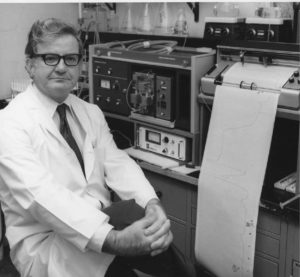
Robert Wallace Brockman, a research biochemist who devoted nearly four decades of his life to the understanding of cancer-cell resistance to chemotherapy, died April in Charlottesville, Virginia. He was 91.
A high school Eagle Scout, honor student and track athlete, Brockman entered the U.S. Army Air Corps in 1943, serving as a meteorologist in India and China during World War II. After the war he enrolled at Vanderbilt, ultimately earning his doctorate in organic chemistry in 1952 and meeting his future wife of 67 years, Jean Early, BA’45, MS’47.
Brockman then joined the new cancer research team at Southern Research Institute (SRI) in Birmingham, Alabama—a group of scientists assembled by Howard Skipper, who developed the initial principles of cancer chemotherapy. Brockman went on to become one of the first researchers to tackle the problem of why some cancer cells are able to resist chemotherapy drugs. He reasoned that biochemical differences in resistant cells act as a shield for the cancer, and he devoted years to identifying these differences.
Through development of effective drugs—those that selectively killed cancer cells but not normal cells—Brockman and his colleagues at SRI were the first to cure a mouse of leukemia.
In 1963, as head of the Drug Resistance Section at SRI, Brockman published a highly praised book chapter outlining the mechanisms of resistance recognized at that time. With these molecular-level mechanisms in mind, the team at SRI began experimenting with combinations of anticancer drugs, eventually proving that cancer that is resistant to one class of drugs could be killed by another. Today cancer is generally treated with combination chemotherapy.
Brockman continued to contribute to the scientific community’s understanding of the biochemical action of antitumor and antiviral drugs until his retirement from SRI in 1990.
After his retirement, the Brockmans moved to Charlottesville. An avid gardener, Brockman spent the next 25 years tending their gardens, watching birds and other wildlife, and tending their home. He is survived by his wife, Jean; two daughters, including Anne Brockman Hoos, BA’77; and two granddaughters.
—PHILLIP B. TUCKER